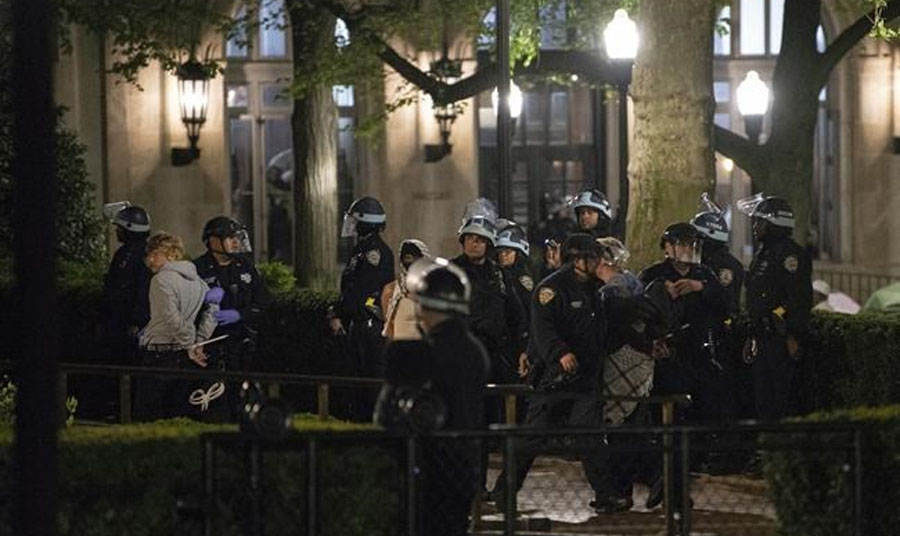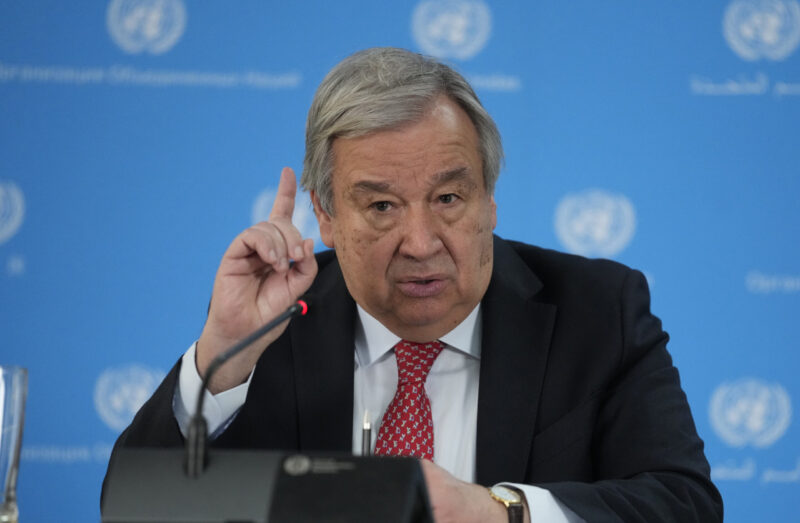International
Ukrainian president says defense is at a ‘turning point’

The Ukrainian president said his country’s defense against the Russian invasion is at a “turning point” and again pressed the United States for more help in the hours after the Kremlin’s forces reneged on a pledge to scale back some of their operations.
Russian forces bombarded areas around Kyiv and the northern city of Chernihiv and intensified attacks in other parts of the country Wednesday, adding to already deep doubts about any progress toward ending the punishing war. Talks between Ukraine and Russia were set to resume Friday by video, according to the head of the Ukrainian delegation, David Arakhamia.
Meanwhile, a delegation of lawmakers from Ukraine’s parliament visited Washington to push the U.S. for increased assistance, saying their nation needs more military equipment, more financial help and tougher sanctions against Russia.
“We need to kick Russian soldiers off our land, and for that we need all, all possible weapons,” Ukrainian parliament member Anastasia Radina said at a news conference at the Ukrainian Embassy.
Ukrainian President Volodymyr Zelenskyy made the case directly to U.S. President Joe Biden.
“If we really are fighting for freedom and in defense of democracy together, then we have a right to demand help in this difficult turning point. Tanks, aircraft, artillery systems. Freedom should be armed no worse than tyranny,” Zelenskyy said in his nightly video address to the nation, which he delivered standing in the dark outside the dimly lit presidential offices in Kyiv. He thanked the U.S. for an additional $500 million in aid that was announced Wednesday.
There seemed to be little faith that a resolution would emerge anytime soon between Russia and Ukraine, particularly after the Russian military’s about-face and its most recent attacks.
READ ALSO:
- Train attack: Terrorists contact hostages’ families
- NDLEA busts five-member airport drug syndicate, seizes N19.8m cash
- IPOB protests move to name Second Niger Bridge after Buhari
Russia said Tuesday that it would de-escalate operations near Kyiv and Chernihiv in order to “increase mutual trust and create conditions for further negotiations.” The announcement was met with suspicion from Zelenskyy and the West. And soon after, Ukrainian officials reported that Russian shelling hit homes, stores, libraries and other civilian sites in or near those areas.
Russian troops also stepped up their attacks on the Donbas region in the east and around the city of Izyum, which lies on a key route to the Donbas, after redeploying units from other areas, the Ukrainian side said.
Olexander Lomako, secretary of the Chernihiv city council, said the Russian announcement turned out to be “a complete lie.”
“At night they didn’t decrease, but vice versa increased the intensity of military action,” Lomako said.
Five weeks into the invasion that has left thousands dead on both sides, the number of Ukrainians fleeing the country topped a staggering 4 million, half of them children, according to the United Nations.
“I do not know if we can still believe the Russians,” Nikolay Nazarov, a refugee from Ukraine, said as he pushed his father’s wheelchair at a border crossing into Poland. “I think more escalation will occur in eastern Ukraine. That is why we cannot go back to Kharkiv.”
Zelenskyy said the continuing negotiations with Russia were only “words without specifics.”
“We know that this is not a withdrawal but the consequences of being driven out,” Zelenskyy said of Russia’s pledge. “But we also are seeing that Russia is now concentrating its forces for new strikes on Donbas, and we are preparing for this.”
Zelenskyy also said he had recalled Ukraine’s ambassadors to Georgia and Morocco, suggesting they had not done enough to persuade those countries to support Ukraine and punish Russia for the invasion.
“With all due respect, if there won’t be weapons, won’t be sanctions, won’t be restrictions for Russian business, then please look for other work,” he said.
In other developments:
—U.S. intelligence officials have concluded that Russian President Vladimir Putin is being misinformed by his advisers about the poor performance of his military in Ukraine because they are too afraid to tell him the truth.
—The German government said it received assurances from Russia that European companies won’t have to pay for Russian gas in rubles. That prospect had raised fears that Russia could cut them off. Also, Poland announced steps to end all Russian oil imports by the end of the year.
— The U.N. is looking into allegations that some residents of the besieged and shattered southern city of Mariupol have been forcibly taken to areas controlled by Russian forces or to Russia itself.
At a round of talks held Tuesday in Istanbul, the faint outlines of a possible peace agreement seemed to emerge when the Ukrainian delegation offered a framework under which the country would declare itself neutral — dropping its bid to join NATO, as Moscow has long demanded — in return for security guarantees from a group of other nations.
Top Russian officials responded positively, with Foreign Minister Sergey Lavrov saying Wednesday that Ukraine’s willingness to accept neutrality and look outside NATO for security represents “significant progress,” according to Russian news agencies.
But skepticism of statements from Russia by Zelenskyy and others seemed well-founded.
READ ALSO:
- Drug War: FG approves N1bn for eye lie detector, goggle for NDLEA
- Putin demands Mariupol surrender to end shelling
- JUST IN: Benue Residents Gunned Down In Fresh Attack
- Russia Says No Breakthroughs in Ukraine Talks, Much Work Remains
Oleksandr Pavliuk, head of the Kyiv region military administration, said Russian shells targeted residential areas and civilian infrastructure in the Bucha, Brovary and Vyshhorod regions around the capital.
Russian Defense Ministry spokesman Maj. Gen. Igor Konashenkov said the military also targeted fuel depots in two towns in central Ukraine with air-launched long-range cruise missiles. And Russian forces hit a Ukrainian special forces headquarters in the southern Mykolaiv region, he said, and two ammunition depots in the Donetsk region, which is part of the Donbas.
In southern Ukraine, a Russian missile destroyed a fuel depot in Dnipro, the country’s fourth-largest city, regional officials said.
The U.S. said that over the last 24 hours, Russia had begun to reposition less than 20% of its troops that had been arrayed around Kyiv.
Pentagon press secretary John Kirby said that troops from there and some other zones have begun moving largely to the north, and some have gone into Belarus. Kirby said it appears Russia intends to resupply them and send them back into Ukraine, but it is not clear where.
The Ukrainian military said some Russian airborne units were recorded in neighboring Belarus and were believed to have withdrawn from Ukraine.
In northern Ukraine, Russian forces took no offensive actions Wednesday, focusing on reconnaissance and logistics, the general staff said in a statement. But Russia is expected to increase attacks soon on Ukrainian forces to protect its own troops as they are repositioned, it said.
The Russians also are expected to try to blockade Chernihiv.
Top Russian military officials have said in recent days that their main goal now is the “liberation” of Donbas, the predominantly Russian-speaking industrial heartland where Moscow-backed separatists have been battling Ukrainian forces since 2014.
Some analysts have suggested that the focus on the Donbas and the pledge to de-escalate may merely be an effort to put a positive spin on reality: Moscow’s ground forces have been thwarted — and have taken heavy losses — in their bid to seize the capital and other cities.
AP
International
Scammers steal over $3.4bn from older Americans – FBI report

Scammers steal over $3.4bn from older Americans – FBI report
Scammers stole more than $3.4 billion from older Americans last year, according to an FBI analysis issued Tuesday, indicating a spike in losses caused by increasingly sophisticated criminal tactics used to deceive the vulnerable into giving up their life savings.
Losses from scams reported by Americans over the age of 60 increased 11% last year compared to the previous year, according to the FBI.
Investigators are warning of an increase in brazen bank account-draining operations that entail deploying couriers in person to collect cash or gold from victims.
“It can have a devastating impact on older Americans who lack the ability to go out and make money,” said Deputy Assistant Director James Barnacle of the FBI’s Criminal Investigative Division. “People lose all their money. Some people become destitute.”
Last year, the FBI received more than 100,000 complaints from victims of scammers over the age of 60, with over 6,000 individuals losing more than $100,000.
It comes after a significant increase in reported losses by older Americans in the two years following the 2020 coronavirus epidemic, when people were confined to their homes and easier to reach over the phone.
Barnacle stated that investigators are finding organised, transnational criminal enterprises targeting older Americans through a variety of schemes, such as romance scams and investment frauds.
READ ALSO:
- 16 passengers burnt to death on Enugu road accident (PHOTOS)
- Multichoice shuns court order, proceeds with increase of DSTV, Gotv packages
- Ogun frees 49 inmates to decongest prisons
Last year, the most common type of fraud reported by older individuals was tech support scams, in which scammers impersonate technical or customer care staff over the phone.
In one such scam, which authorities say is becoming more popular, criminals impersonate technology, banking, and government officials to convince victims that foreign hackers have infiltrated their bank accounts and that they should transfer their funds to a new account that the scammers secretly control.
According to the FBI, between May and December, there was an increase in scammers utilising live couriers to steal money from victims who were fooled into believing their accounts had been hijacked.
In those circumstances, scammers inform victims that their bank accounts have been compromised and that they must sell their possessions for cash or purchase gold or other precious metals to secure their savings. The fraudsters then arrange for a courier to collect it in person.
“A lot of the fraud schemes ask victims to send money via a wire transfer or a cryptocurrency transfer. When the victim is reluctant to do that, they’re given an alternative,” Barnacle said. “And so the bad guy will use courier services.”
According to prosecutors, an 81-year-old Ohio man shot and killed an Uber driver who he believed was attempting to rob him after receiving fraudulent phone calls earlier this month.
The man had been receiving calls from someone claiming to be an officer from the local court and demanding money.
The Uber driver had been instructed to get a package from the man’s residence, a request that officials believe was made by the same hoax caller or an accomplice.
The enormous losses to older Americans are most likely an underestimate. Only roughly half of the more than 880,000 complaints submitted to the FBI’s Internet Crime Complaint Centre last year included information about the victim’s age.
Scammers steal over $3.4bn from older Americans – FBI report
International
Gaza: Protesters clash at UCLA, police arrest pro-Palestine demonstrators at Columbia University

Gaza: Protesters clash at UCLA, police arrest pro-Palestine demonstrators at Columbia University
Violent skirmishes broke out on Wednesday on the campus of the University of California, Los Angeles (UCLA) between pro-Palestinian protesters and a group of counter-demonstrators, a live video coverage by a US broadcaster revealed.
According to the UCLA student publication Daily Bruin, supporters of Israel attempted to knock down a pro-Palestinian protest campsite on campus.
Police were responding to UCLA Chancellor Gene Block’s call for assistance, said Zach Seidl, Los Angeles Deputy Mayor of Communications, on X.
READ ALSO:
- UN warns Israel assault on Gaza’s Rafah on ‘immediate horizon’
- Gaza: Israeli PM Netanyahu says Rafah attack will happen despite deal
- Gaza: Israeli PM Netanyahu says Rafah attack will happen despite deal
The October 7 attack on southern Israel by Hamas terrorists from Gaza, followed by an Israeli offensive on the Palestinian territory, has sparked the largest outpouring of US student action since the 2020 anti-racism rallies.
Aerial footage from KABC, an ABC affiliate, showed people using sticks or poles attacking wooden planks set up as a temporary barricade to defend pro-Palestinian protesters, some of whom held placards or umbrellas.
Late on Tuesday, New York City police detained scores of pro-Palestinian activists holed up in an academic building on Columbia University’s campus in New York and dismantled a protest encampment that the Ivy League school had attempted to destroy for nearly two weeks.
Gaza: Protesters clash at UCLA, police arrest pro-Palestine demonstrators at Columbia University
Reuters
International
UN warns Israel assault on Gaza’s Rafah on ‘immediate horizon’

UN warns Israel assault on Gaza’s Rafah on ‘immediate horizon’
UNITED NATIONS, April 30 (Reuters) – The United Nations on Tuesday warned that an Israeli assault on Rafah in the Gaza Strip was “on the immediate horizon” and that “incremental” progress by Israel on aid access to the enclave could not be used to prepare for or justify an operation.
U.N. Secretary-General Antonio Guterres appealed for states with influence over Israel “to do everything in their power” to prevent an Israeli assault on Rafah in southern Gaza, where more than 1.2 million displaced Gaza Palestinians are sheltering.
Israel’s Prime Minister Benjamin Netanyahu vowed on Tuesday to go ahead with a long-promised assault, whatever the response by Hamas to latest proposals for a halt to fighting in the nearly seven-month-long war and a return of Israeli hostages.
“The world has been appealing to the Israeli authorities for weeks to spare Rafah, but a ground operation there is on the immediate horizon,” said U.N. aid chief Martin Griffiths in a statement. “The simplest truth is that a ground operation in Rafah will be nothing short of a tragedy beyond words.”
Israel pledged nearly a month ago to improve aid access to the enclave of 2.3 million people after U.S. President Joe Biden demanded steps to alleviate the humanitarian crisis, saying the U.S. could place conditions on support if Israel did not act.
Guterres told reporters that there had been “incremental progress” toward averting “an entirely preventable, human-made famine” in northern Gaza, but much more was urgently needed.
READ ALSO:
- Gaza: Israeli PM Netanyahu says Rafah attack will happen despite deal
- Gaza: Israeli PM Netanyahu says Rafah attack will happen despite deal
- Georgia rocked by clashes over ‘foreign agent’ bill
“These improvements in bringing more aid into Gaza cannot be used to prepare for or justify a full-blown military assault on Rafah,” Griffiths said.
Guterres specifically called on Israel to follow through on its promise to open two crossings to the north.
“A major obstacle to distributing aid across Gaza is the lack of security for humanitarians and the people we serve. Humanitarian convoys, facilities and personnel, and the people in need must not be targets,” Guterres told reporters.
NO ALTERNATIVE TO LAND
A U.N.-backed report in March said famine was imminent and likely by May in northern Gaza, and could spread across the enclave by July. Guterres said the most vulnerable in the north “are already dying of hunger and disease.”
When asked what leverage the U.S. could use over its ally Israel to boost aid access and avert a Rafah assault, Guterres said: “It is very important to put all possible pressure in order to avoid what would be an absolutely devastating tragedy.”
U.S. Secretary of State Antony Blinken has said he will discuss with Netanyahu on Wednesday measures that Israel still needs to take to increase the flow of aid into Gaza.
“I strongly encourage the government of Israel and the Hamas leadership to reach now an agreement,” Guterres said. “Without that, I fear the war, with all its consequences both in Gaza and across the region, will worsen exponentially.”
The U.N. is in talks with the U.S. about a floating pier it is constructing to allow maritime aid deliveries to Gaza from Cyprus. Guterres said: “We welcome aid delivery by air and sea, but there is no alternative to the massive use of land routes.”
Israel’s Deputy U.N. Ambassador Jonathan Miller said last week that Israel continued “to elevate and step up” its aid support and that there had been substantial results with a “dramatic increase” in the volume of aid over the past several months.
Israel is retaliating against Hamas in Gaza over an Oct. 7 surprise attack on southern Israel led by the militant group.
Israel says about 1,200 people were killed and more than 250 people were taken hostage in the assault. Gaza health authorities say Israel has killed more than 34,000 people in its offensive in Hamas-run Gaza since then.
UN warns Israel assault on Gaza’s Rafah on ‘immediate horizon’
Reuters
-

 metro24 hours ago
metro24 hours agoLabour Day: Nigerian workers are dedicated, resilient, says NURTW leader
-

 Education2 days ago
Education2 days agoBREAKING: JAMB releases 2024 UTME results
-

 News2 days ago
News2 days agoSeun Kuti retracts allegation on P&ID fraud, tenders apology
-

 News2 days ago
News2 days agoTerrorist negotiator Tukur Mamu seeks transfer out of DSS custody to Kuje prison
-

 metro2 days ago
metro2 days agoBREAKING: Suspected herders kill 3 mourners, farmers in Enugu
-

 News2 days ago
News2 days agoGanduje probe: Kano commission invites public for information
-

 Auto5 hours ago
Auto5 hours agoAppeal court takes over NURTW case as NIC withdraws
-

 Sports2 days ago
Sports2 days agoApologise or face legal action, Enoh warns Bash Alli






















